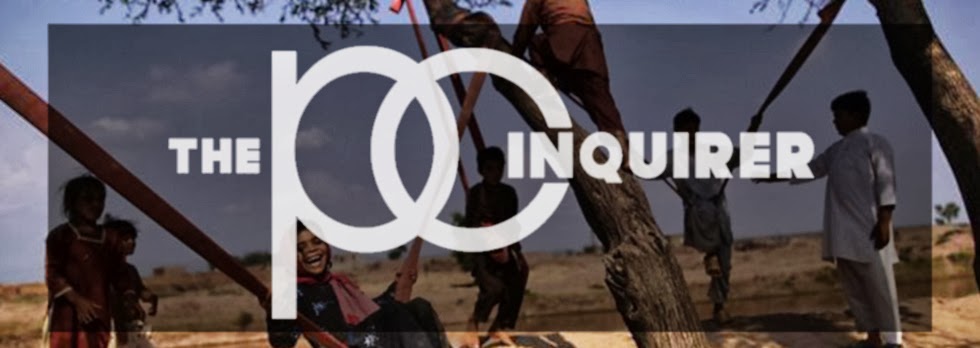Reporter Rabia Ali asks: Minorities' share of jobs equals sanitary work only?
Have we become the inside joke in a country that does not value the labour of a man's hands? I wonder sometimes though, are we not meant to clean up the world anyhow? I heard someone once say that Jesus won the battle, we are the clean up crew in the aftermath. Picking up the brokenhearted and the lost, the angry and the hopeless. We're the ones supposed to be making this a fit place for the King --so that once He arrives in His victory parade that this place is covered in the culture of His Kingdom. He arrives to the best possible scenario --and He's literally given us all the help we'll need in the Holy Spirit.
Ok preaching aside, this is a painful reality. I don't want to and nor do I think it's possible to sugarcoat the rampant injustice that Christians and really all religious minorities face in Pakistan. I just hope that with the way it's being shared worldwide that something will come of it. Muslims are always commenting their rage at how sad it is that minorities are treated with such disregard and even malice in their countries --but I don't think we can expect much more than agreement from the "moderate" citizens. What we can do is keep speaking, keep sharing and SET OURSELVES APART.
Stop conforming to and enforcing our own stereotypes. At least among ourselves we need to change our perspectives and not look down on people with certain positions. Maybe our influence through our lives can reach others, after all --isn't that our real job?

KARACHI:
Asif Ghani Masih starts his day by sweeping the dusty corridors of the Sindh Secretariat. As the day progresses, he scrubs dirty toilets and empties dustbins, tasks that are part of his day job as a sanitation worker.
In the evening, however, the 27-year-old becomes a neatly dressed student, who attends classes for a Bachelor’s degree; the tasks of the day shelved away as he scribbles notes. At school, he had often dreamt of being an engineer.
Three years ago, Masih was thrilled when he heard about the five per cent minority quota in all Sindh government departments. The prospect of having a secure job and pension made the intermediate graduate leave his job at a small, cash-strapped courier company and apply for a clerical post at the secretariat.
“I was hoping that my education would be enough to land me a decent desk job,” says Masih, as he sits in his modest house in Old Golimar. “But when the list came out I was shocked to see myself appointed as a sanitary worker in the finance department.” His eyes fill with tears as he remembers the day. “It hurts to be called a bhangi [sanitation worker],” he adds.
The ‘lucky’ few
For the religious minorities’ members lucky enough to land government jobs on the oft-bragged five per cent job quota, the only positions available at dozens of departments for them are of sanitation workers.
Take, for example, all 21 janitors who work with Masih. All of them are Christians or Hindus. Of the 16 who work at the Sindh minorities’ affairs department, most are Christians or Hindus too.
Even educated young men can’t get anything out of the quota but jobs as sanitary workers. He was a role model for his family, but does not like to talk about his job with them.
“Of the few educated youngsters in my family, I was lucky to land a job in the Express Courier Link and worked there for almost eight years,” said Masih. He started off in the customer services section and became an operations manager, but then switched gears in favour of a permanent government job.
Months ago, Masih had applied for the position of a dispatch rider at another department, but had no luck. He has reached out to politicians also but received no replies.
Sad plight
At the Sindh law department, a Hindu employee, who spoke on condition of anonymity fearing his dismissal from service, said he had completed a college degree but is suffering due to his different beliefs.
“This is what the poor and minorities get for educating themselves,” he said. “We are suffering because of our faith.” He does not plan to spend money on educating his child, as he believes that won’t help him get a decent job in the end. The sanitary worker had got the job on minority quota after he asked for help from his community’s political representatives.
“It is sad that uneducated Muslims are appointed as clerks and cannot even write their names, but we are cleaning trash.”
Cold shoulder for Sikhs
The plight of young men from the Sikh community is no different too; they have been entirely left in the cold. Vijesh Singh, 28, applied to the Sindh wildlife department but never heard back. “Many of our people are turning towards shipping, since there we don’t have any Sikhs in the government and there is no one to pursue our case,” he says
MPA Saleem Khokhar acknowledges the issue. Minority members are only given such jobs, he said. “Muslims who are appointed sanitation workers, do not work and only draw their salaries,” he claimed.
Michael Javed, a Christian community representative, alleges that this is not happening in Karachi only, but across the province also. He cited an example in Jamshoro, where a Bachelor’s graduate Danish was appointed as a sweeper. “All nine graduates who applied for desk jobs were given posts of sanitation workers,” Javed said. “Three of them refused to take the job.”
Published in The Express Tribune, July 9th, 2012.

No comments:
Post a Comment